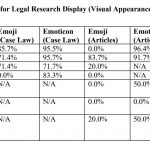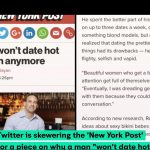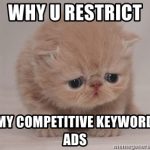
Legal Research Services Are Struggling With Emojis and Emoticons
Jennifer L. Behrens, a law librarian at Duke Law School, has posted an article: “Unknown Symbols”: Online Legal Research in the Age of Emoji.” She conducted numerous search queries to see how the major legal research services handled case opinions…

E*Trade Defeats Copyright Claim Over Dancing Old Man in Commercial–Vacchi v. E*Trade
Gianluca Vacchi is an Italian entrepreneur. He has a large social media presence, including nearly 12M Instagram followers and 1.8M Facebook followers. He claims his social media presence depicts a fictional alter ego who is “an extravagant millionaire dancing with…

More Teenagers Mistakenly Think “Private” Chat Conversations Will Remain Private–People v. JP
This is a story of four teenage girls and one teenage boy. The girls use the aliases “7Up” (a/k/a JP, the defendant in this case), “Lady Gaga,” “Dream Ruiner,” and “Me.” The boy, called S, allegedly engaged in anti-social behavior…

Partial Screenshot Qualifies as Fair Use (on a Motion to Dismiss)–Yang v. Mic
We’ve blogged about a few cases involving screenshots of newspaper pages consisting of copyrighted photos, including Clark v. TransAlt and Hirsch v. Complex Media. This case adds to that canon, but not in a particularly enlightening way. The screenshot at…

Section 230 Helps Search Engine Defeat “Right to Be Forgotten” Lawsuit–Mosha v. Yandex
Looking holistically at the broad arc of Internet Law history, I could make a good case that the EU’s Right to Be Forgotten marked the beginning of the end of the modern Internet. It was the first time that a…
“Copyright Troll” Lawyer Gets Sanctioned (Again)–Sands v. Bauer Media
Attorney Richard Liebowitz has filed more than 1,100 lawsuits since the beginning of 2016, a campaign this judge calls a “downpour.” This initiative has not gone smoothly. The court recaps: Mr. Liebowitz has been sanctioned, reprimanded, and advised to “clean…

Competitor Gets Pyrrhic Victory in False Advertising Suit Over Search Ads–Harbor Breeze v. Newport Fishing
The litigants compete in the whale watching industry in LA/Orange Counties. The plaintiffs operate out of Long Beach/San Pedro, the defendants out of Newport Beach. If you’re not familiar with the geography, Long Beach and Newport Beach are about 20…

IP/Internet/Antitrust Professor Amicus Brief in 1-800 Contacts v. FTC
Prof. Mark Lemley (Stanford Law) and I filed an amicus brief in 1-800 Contacts v. FTC with the Second Circuit on behalf of 29 professors of intellectual property, Internet law, and antitrust. The abstract: The case involves 1-800 Contacts’ settlement…
Ninth Circuit Declines to Shelve Lawsuit Alleging Facebook Violated Illinois Biometric Privacy Statute
Illinois enacted a biometric privacy statute which restricted the collection of biometric identifiers. Plaintiffs, Illinois residents and Facebook users, alleged that Facebook violated this statute by collecting, storing, and processing their face-scans without their consent and without establishing the requisite…

Terrible Ninth Circuit 230(c)(2) Ruling Will Make the Internet More Dangerous–Enigma v. Malwarebytes
The Ninth Circuit has issued a Section 230(c)(2) opinion that creates significant problems for anti-spyware/spam/virus vendors (I’ll call them “anti-threat vendors”). The ruling will paralyze their decision-making, expose them to greater legal threats, and reduce their ability to protect consumers…
